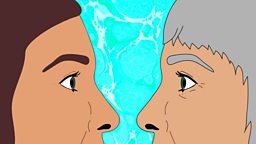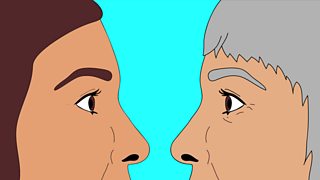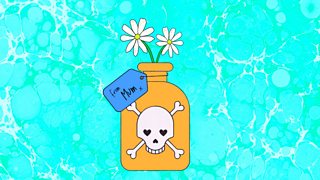‘The behaviour is so harmful’: What to do if you have a narcissistic mother

Over the last few months, Woman’s Hour has been hearing the stories of women who believe that they were raised by mothers who have narcissistic traits.
We heard from ‘Charlotte’ who for 40 years thought that her mother’s behaviour was her fault, only to realise in therapy that her mother was a narcissist. ‘Scarlett’ told us about cutting off her narcissistic mother with no regrets. And ‘Louise’ and her husband ‘Ed’ told us about their determination to make sure their parenting style did not mirror that of ‘Louise’s’ mother.*
In the final part of the series, Woman’s Hour’s Nuala McGovern spoke to two psychotherapists about the characteristics of narcissistic mothers, what impact their behaviour can have, and what people can do if they think their parent is one.
Read on for their advice.
The phrase ‘narcissist’ is often bandied about in casual conversations. But that’s a mistake, say psychotherapists Dr Jan McGregor Hepburn and Helen Villiers, who has an MA in working therapeutically with adult children of narcissists and is a co-host of the podcast ‘In Sight – Exposing Narcissism’.
Narcissistic Personality Disorder (NPD) is a formal diagnosis usually made by psychiatrists and it’s a very severe mental health condition, says Helen. ‘The behaviour is so harmful’.
Jan agrees: ‘Being around a narcissist is very difficult and painful and can often make you feel you're in the wrong’.
The impact of a narcissistic mother can be stronger than a narcissistic father, according to Jan. ‘In most families, not in all families, the mum's the person who gives birth to you, so the conduits and the attachments tend to be stronger [than with the father]. So the impact would tend to be stronger, I would say.’

There are five main traits when talking about narcissists, says Helen: Grandiosity - an inflated sense of superiority; a huge level of entitlement - ‘I will just take what I want whenever I want regardless of the cost to other people’; exploitation - using people to meet that entitlement need; motivational empathy - ‘I'm just so sad because I've hurt you’, and asking people to feel bad for you for making you feel bad; and then impaired self-awareness'.
The light bulb moment is only possible when you are free enough to see.
‘When we see all those five traits, and they might appear overtly or covertly, the impact is massive’, Helen adds. ‘What I see in my client group is a huge range of mental health conditions, but primarily complex post-traumatic stress disorder, which involves having emotional flashbacks. We see eating disorders, self-harm, anxiety, chronic depression, a huge lack of identity, very, very low self-esteem and self-worth'.
Helen thinks that it’s important to talk about the ‘devastating’ impact of narcissism, so we can try and remove ourselves from the idea that it's a ‘buzzword’.
It could take someone a long time to realise that they’ve been around someone with narcissistic traits, adds Jan. ‘The light bulb moment is only possible when you are free enough to see and usually when you have somebody else to help you switch it on.’
This realisation can also be delayed because as a child they’ve been told that they’re the problem in the relationship, says Helen. ‘But they aren't. They aren't the problem at all. It's the behaviour that's been exhibited towards them.’

So, if someone thinks their mother might be a narcissist, what can they do? And can they get their parent to change their behaviour?
Here are Helen’s tips:
1. Get reading
It’s important to learn about emotional abuse and narcissism, according to Helen. Podcasts and online resources are great, but make sure you’re getting your information from educated spaces, not just anecdotal spaces, she says. ‘Everyone’s experience is unique. There are similarities, of course, but one person’s isn’t everyone’s’.
2. Think about therapy
‘If you can, access therapy, but ask the therapist if they understand emotional abuse and narcissistic parents so you don’t have to explain everything to them’, says Helen.
‘If you access therapy, ask the therapist their position on going ‘no contact’. We don’t want a therapist who has an opinion about it either way. It should be client led, and there’s a risk some therapists may invalidate their clients by pushing for attempts at resolution with a toxic parent or partner.’
3. It’s fine to feel how you feel
‘If it hurts you, it hurts you, it doesn’t matter if they meant it or not. It matters that it hurt you’, says Helen. ‘Impact is more important than intention.’
4. You’re not alone
‘This is a very common experience and one that many people will relate to’, says Helen. ‘But be careful who you share this with. People who are in the same system may invalidate your experience because of their own denial. Start with a therapist or someone who doesn’t benefit from the family system operating in dysfunction.’
5. Know that you did nothing to deserve this
‘Narcissistic parents project identities onto their children that have nothing to do with who the child is at all’, says Helen. ‘They don’t see you; they see an image of you that they created. Their behaviour isn’t about you, it’s about them.’
6. Be wary of toxic hope
‘Be careful that you aren’t staying in relationships because of toxic hope’, says Helen. ‘It’s the idea that they will become the person you hope they will be.’
7. Be kind to yourself
‘You deserve love, kindness and respect’, emphasises Helen. ‘It’s not too much to ask for.’
You can listen to the whole Woman's Hour Narcissistic Mothers series here. Join the conversation on Instagram and Twitter @bbcwomanshour.
*All names have been changed.





